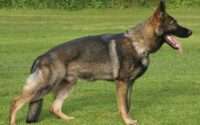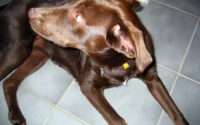Wondering How Long After Eating Do Dogs Poop? We Have the Answers!
Get ready to dive into the captivating world of canine digestion with BarkLikeMeow’s guide: ‘How Long After Eating Do Dogs Poop?’ As dedicated pet parents, we know that understanding our four-legged companions is key to their happiness and health.
And what could be more essential to your dog’s well-being than knowing exactly when they’ll need that post-meal bathroom break? Join us on this exciting journey as we demystify the timeline of your dog’s digestion process.
The Basics of Canine Digestion
Before we dive into the fascinating intricacies of digestion timelines, let’s take a moment to explore the basics of how our canine companions process food. Understanding the journey that a meal takes through their digestive tract will provide essential context for the rest of our exploration.
A dog’s digestive system is a marvel of nature, specifically designed to cater to their carnivorous ancestry. When your pup chomps down on a tasty meal, it sets off a series of events that ensure their body receives the nutrients it needs.
- Mouth: Digestion begins in the mouth, where enzymes start breaking down food, primarily carbohydrates.
- Stomach: The partially digested food moves into the stomach, where acids and enzymes continue the process.
- Small Intestine: This is where the magic happens. Nutrient absorption occurs as food particles are broken down into smaller, more manageable components.
- Large Intestine: Finally, any remaining indigestible material makes its way to the large intestine, where water is absorbed, and the waste is formed into stool.
While there are some similarities between canine and human digestion, there are also significant differences. For instance, dogs have shorter digestive tracts, reflecting their carnivorous nature, and their stomachs are more acidic, which helps them break down raw meat efficiently.
Understanding these fundamental aspects of canine digestion sets the stage for our exploration of the factors that influence when our dogs will need to answer nature’s call after a meal. So, let’s continue our journey through the fascinating world of doggie digestion!
Factors That Affect Digestion Speed
Now that we’ve laid the foundation with the basics of canine digestion, it’s time to delve into the intriguing factors that can influence how long it takes for your dog to poop after eating.
Breed-Specific Variations in Digestion
Just as every dog has its own unique personality, breeds can exhibit variations in their digestion. Some breeds may have faster or slower digestive processes due to their genetic makeup. Understanding your dog’s breed characteristics can provide valuable insights into their digestion.
Age and Life Stage Considerations
Age matters when it comes to digestion. Puppies, for instance, have immature digestive systems that work differently from adult dogs. As dogs age, their metabolism and digestion can change, impacting the time it takes for food to pass through their system.
Size and Weight of the Dog
The size and weight of your dog also play a role in digestion. Smaller dogs often have faster metabolisms, which can result in quicker digestion. Conversely, larger dogs may take longer to process their meals.
Dietary Factors
What your dog eats is a major determinant of digestion speed. Factors to consider include:
- Types of Food: Dry kibble, wet food, and raw diets all have different digestion rates.
- Ingredients and Quality: The quality of ingredients in your dog’s food can impact digestion. High-quality ingredients are often easier for dogs to digest.
Meal Size and Frequency
The size and frequency of your dog’s meals matter. Smaller, more frequent meals can lead to more consistent digestion, while larger meals might take longer to process.
Health Conditions and Medications
Certain health conditions or medications can affect digestion. Chronic conditions, such as gastrointestinal disorders, may slow digestion, while medications can have varying effects.
Exercise and Physical Activity
Exercise can stimulate digestion. Dogs that are active and engage in physical activity may have faster digestion times compared to more sedentary pets.
How Long After Eating Do Dogs Poop?
Now that we’ve explored the multitude of factors that influence digestion speed, it’s time to get a clearer picture of average timeframes for dogs to poop after eating. Keep in mind that these are general guidelines and can vary widely depending on the factors we discussed earlier.
General Guidelines for Puppies
Puppies tend to have quicker digestion due to their higher metabolism. It’s not uncommon for a young pup to need to go outside within 15-30 minutes after a meal.
Adult Dogs with Regular Diets
For most adult dogs on a regular diet, you can expect them to poop anywhere from 30 minutes to 2 hours after eating. However, remember that individual variation is normal.
Senior Dogs and Digestion Changes
As dogs age, their digestion may slow down. Senior dogs might take longer to process their meals, with some needing to relieve themselves 2-4 hours after eating.
Signs That Your Dog Needs to Poop
Understanding your dog’s body language and behavior is essential for effective communication. Dogs often give subtle hints when they need to relieve themselves. Here are some common signs to look out for:
- Restlessness: If your pup seems unusually restless or anxious, it could be a sign that they need to go outside.
- Sniffing Around: Dogs have an incredible sense of smell, and they’ll often start sniffing the ground or circling an area when they need to poop.
- Whining or Pawing at the Door: Some dogs will whine, scratch, or paw at the door when they want to go outside. It’s their way of letting you know it’s time for a bathroom break.
- Resting Their Nose on the Ground: A dog lowering their nose to the ground and remaining still is a clear indication that they’re focusing on a scent, possibly marking the spot where they intend to poop.
- Pacing: Dogs may start pacing back and forth, exhibiting a sense of urgency, indicating they can’t wait much longer.
By paying attention to these subtle cues, you can become attuned to your dog’s needs and ensure they have timely access to the great outdoors.
House Training and Predicting Poop Times
House training your pup is a crucial step in their development, and predicting when they need to poop is central to this process. Here are some strategies to help you navigate this important aspect of pet ownership:
- The Importance of a Consistent Schedule: Dogs thrive on routine. Establish a regular feeding schedule and stick to it. Consistency will help you predict when your dog is likely to need a bathroom break.
- Crate Training and Its Impact on Digestion: Crates can be incredibly helpful tools for house training. Dogs are less likely to soil their living space, so using a crate can help you predict when they need to go outside.
- Using Cues Like After-Meal Bathroom Breaks: As we discussed earlier, most dogs will need to poop within 30 minutes to 2 hours after eating. Use this knowledge to your advantage by taking your dog outside shortly after mealtime.
- Tools and Apps for Tracking Your Dog’s Habits: There are several handy apps and tools available that can help you track your dog’s bathroom habits. These can provide valuable insights into their specific patterns.
Remember, patience and positive reinforcement are key when house training your pup. Celebrate their successes, and avoid scolding for accidents. With time and consistent effort, your furry friend will learn to communicate their needs effectively.
Stay tuned as we continue our exploration of canine digestion, diving into what to do if your dog’s poop schedule is irregular, and offering tips for managing poop clean-up. Your journey to becoming a knowledgeable and responsible dog owner is well underway!
What to Do If Your Dog’s Poop Schedule Is Irregular
Sometimes, despite your best efforts, your dog’s poop schedule may become irregular. Don’t worry; it happens to the best of us. Here’s what you can do if you find yourself in this situation:
- When to Consult with a Veterinarian: If your dog’s poop habits suddenly change or become consistently irregular, it’s essential to consult with your veterinarian. Underlying health issues could be the culprit, and early detection is key to addressing any concerns.
- Potential Underlying Health Issues: Digestive problems, allergies, infections, or dietary sensitivities could be causing irregularity. Your vet can perform tests and recommend treatments or dietary adjustments if needed.
- Dietary Adjustments for Better Digestion: Working closely with your veterinarian or a canine nutritionist, you can fine-tune your dog’s diet to promote regular digestion. This may involve selecting foods that are easier on their stomach or adjusting portion sizes.
- Lifestyle Changes to Improve Regularity: Consider making changes to your dog’s daily routine. Increasing exercise, adjusting feeding times, or providing a more stress-free environment can all contribute to more predictable poop schedules.
Remember that your dog’s well-being is your top priority, and addressing irregularities in their poop schedule is just one aspect of responsible pet ownership.
Tips for Managing Poop Clean-Up
Now, let’s talk about the less glamorous, but equally important aspect of dog ownership: poop clean-up. Proper disposal and hygiene are crucial, both for your dog’s health and your living environment.
- Proper Disposal and Hygiene: Invest in a good poop scoop or bag to pick up after your dog promptly. Always tie bags securely before disposing of them in designated bins. Wash your hands thoroughly afterward to prevent the spread of bacteria.
- Choosing the Right Poop Bags: Not all poop bags are created equal. Opt for sturdy, leak-proof bags to minimize mess and odor. Biodegradable options are eco-friendly and readily available.
- Cleaning and Odor Control: Accidents happen. If your dog has an accident inside, clean it up promptly with pet-friendly cleaning products. Proper cleaning helps prevent repeat offenses and eliminates lingering odors.
- Environmental Considerations: Be mindful of the environment. Dispose of poop in designated bins or follow local regulations. Avoid leaving it on trails, sidewalks, or in public spaces.
By following these tips, you can maintain a clean and healthy environment for both you and your furry friend. Responsible poop clean-up is not only courteous to others but also essential for maintaining a safe and hygienic living space.
Conclusion
We hope this comprehensive guide has shed light on the intriguing world of canine digestion and answered your questions about when dogs poop after eating. Our furry friends rely on us to provide them with the best care, and understanding their unique needs is at the heart of responsible pet ownership.
Remember, every dog is an individual, and factors like breed, age, diet, and health play a role in their digestion patterns. By paying close attention to your dog’s cues and establishing a consistent routine, you can become a more attuned and responsible dog owner.
Responsible pet ownership goes beyond feeding and sheltering; it encompasses understanding, patience, and care. Your commitment to your furry friend’s well-being is truly commendable, and we’re here to support you on this wonderful journey.
Frequently Asked Questions
Is it normal for my dog to poop immediately after eating?
A: While it’s not unusual for some dogs to have quick digestion, it can vary. Factors like breed, age, and diet play a role. If it consistently happens, consult your vet to rule out any issues.
My dog’s poop schedule seems erratic. Should I be concerned?
A: Occasional variations are normal, but if you notice consistent irregularities, it’s worth a vet visit. Digestive issues or dietary problems could be at play.
Can I predict when my dog will poop after eating?
A: Yes, to an extent. Most dogs will poop within 30 minutes to 2 hours after a meal. Establishing a routine and paying attention to their cues can help you predict when they’ll need to go.
Are there any foods that help regulate my dog’s digestion?
A: Consult with your veterinarian to select the right food for your dog’s specific needs. High-quality, easily digestible ingredients can promote regular digestion.
How can I minimize the odor when cleaning up after my dog?
A: Consider using odor-neutralizing cleaning products. Proper and immediate clean-up also helps prevent lingering smells.
Can I train my dog to poop on command?
A: Yes, with patience and consistency, you can teach your dog to poop on cue. This can be particularly helpful for those times when you need them to go quickly.
My dog sometimes eats grass before pooping. Is this normal?
A: Yes, it’s relatively common for dogs to nibble on grass before they poop. While the exact reason isn’t fully understood, it’s believed that grass can help them ease any digestive discomfort or stimulate vomiting if needed.
Can stress or anxiety affect my dog’s digestion and poop schedule?
A: Yes, stress and anxiety can impact your dog’s digestion. Dogs are sensitive creatures, and emotional factors can lead to changes in their poop schedule. If you suspect stress is affecting your dog, consult with a veterinarian or a professional dog trainer for guidance.
My dog has diarrhea frequently. What should I do to help regulate their digestion?
A: Frequent diarrhea can be a sign of underlying issues, such as dietary sensitivities or infections. Consult your vet for a thorough examination and dietary recommendations. It’s essential to keep your dog well-hydrated during episodes of diarrhea.
Is it normal for my dog to poop more or less frequently as they age?
A: Yes, as dogs age, their poop schedule can change. Senior dogs may poop less frequently due to a slower metabolism, while puppies tend to go more often. Monitoring these changes and discussing them with your vet during regular check-ups is advisable.




